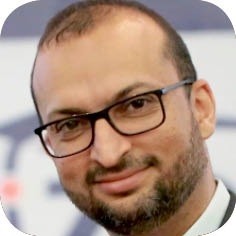Ahmad, Mona, and Ibrahim, three young people from Palestine, were not convinced that they should follow the traditional path of life that is customary in our community and culture. Mona and Ahmad finished their education but did not marry early, did not suffer from unemployment, did not accept a regular job, and did not start their adult life by taking loans from banks to buy a car or apartment − to be paid back in installments over the next twenty years. Ibrahim did not enroll in a university but instead chose an innovative vocational education; yet, to provide for his children, he did not become a worker who must pass through the humiliating checkpoints that have been erected by the occupation. These three youths believed in science and technology and were creative in this field, which led to their success and enabled them to make their way to the top. They built their own projects, and through them, they are helping to shape the future of Palestine.
All statistics indicate that Palestinian society is young and able to rise from the rubble of recent years through the efforts of its youth − if they perform well. Palestine has succeeded in reshaping its young people; we are moving from underperforming in the scientific field to excellence and innovation in science, technology, and engineering. Let us consider some figures to remind us of the Palestinian reality. Forty-seven percent of the population in the West Bank, Gaza, and East Jerusalem are under the age of 17; 24 percent are in the age group of 18-to-29-year-olds; and in 71 percent of families, there is at least one young man or woman who can support his/her family. According to the Palestinian Central Bureau of Statistics, 35 percent (28 percent in the West Bank and 46 percent in the Gaza Strip) of youth are willing to earn advanced scientific degrees (e.g., an MA or PhD), which indicates a high degree of ambition among our youth to acquire scientific capital and improve their employment opportunities and income. Unfortunately, however, interviews with various youth groups indicate that the aim of continuing their education is to obtain an immigration visa that would allow them to live somewhere else; they do not wish to stay in Palestine.
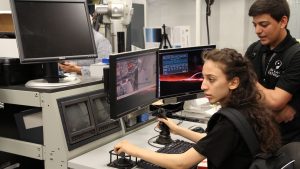
It was also noted that, based on the same data, most of the youth (75.5 percent) do not read newspapers or magazines. A similar percentage (76 percent) said that they use the computer daily and communicate with the world through social media to search for opportunities abroad. They are looking for groups to join or groups that wish to forge relations with foreigners, all in the hope that these connections may take them elsewhere. Some use social media simply as a platform for discharge and as a way of spending their time. Participation in political life, on the other hand, has become rare and limited among Palestinian youth; 135 talented young men and women around the age of 18 hardly recognized three Palestinian politicians or party leaders out of the 12 presented to them during an educational workshop I led recently! This dangerous phenomenon takes our youth into the category of the superficial and will not lead to a broad scientific, social, economic, or even political renaissance.
The natural path for most of our youth, whether they are in school or not, is the path that Ahmad, Ibrahim, and Mona did not take. They were not useless social-media addicts; they invested in their scientific and technological capabilities, relied on creativity and leadership, and succeeded in changing reality through science and knowledge.
Can our youth become science professionals and turn such science into promising economic opportunities? The answer is yes, and the means to achieve this end lies in investing in, promoting, and advocating for three significant sectors: community culture, science-teaching, and entrepreneurship investment.
Ahmad invented an interactive board that transforms every white surface into a smart board. He developed the idea and established a small company. He ran this enterprise until he achieved his first exit (i.e., he sold the company for a profit) and worked for several large technology companies to gain experience before he established a new entrepreneurial company that he expects will have prominent status in the Arab world.
Mona invented a robot to spray insecticides on greenhouse plants and registered and marketed it inside and outside Palestine. She headed forward towards innovation and entrepreneurship. Today, Mona is running a company and leads entrepreneurship initiatives around the world.
Ibrahim started with a small potato-harvesting machine that does not cause damage to the products and gradually developed the idea into creative manufacturing of agricultural machines. Currently, he owns a factory that manufactures machines that he sells everywhere.
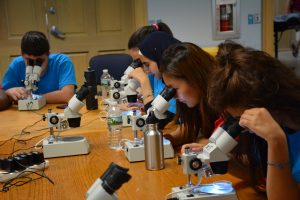
The three of them started with an idea, and the three of them came from different regions and backgrounds. None of them had either capital or a rich family to support them. They invested in science and entrepreneurship to change their reality and build their future, not for luxury or entertainment. They worked hard and patiently, and they failed in the beginning. But they learned and persevered until they managed to get on the right track. They progressed slowly but steadily and responsibly.
We must change the community culture and understand that education is not only for welfare; natural science and technology are tools that build our future and enhance our economy through production instead of consumption, attention to small details, and knowledge-based, real development. In science-teaching, we must seriously and practically invest first in the teachers because they can have a positive influence. A teacher’s passion and production will be conveyed to the students. We have a school textbook that stimulates production and encourages work and activity; the main task of teachers now is to change the image of science in our schools and universities. This is the great responsibility of the person who transmits scientific knowledge that tends to have great psychological and pedagogical impact on the learner. Teachers must offer their students an opportunity to discover things and motivate them to do research with currently available technology.
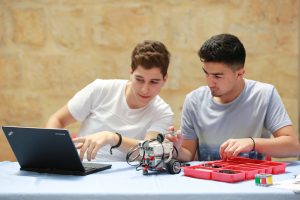
Advocacy in supporting leadership is a mission that falls within the responsibility of the Palestinian government and the Palestinian national private sector, which must engage so that we can succeed as a nation. Taking the initial risk in every scientific entrepreneurship is usually the responsibility of the state. Four years ago, we saw the establishment of the Higher Council for Creativity and Excellence that set up a fund for investment into innovation; and it has already invested in six new start-up companies this year. Now, the private sector is looking for promising opportunities. Take the initiative, participate in the risk, and invest in our youth and their projects − not out of pity or as charity but from an investment viewpoint and to assist youth in accessing local and global markets.
In our society, we have become used to the patriarchal approach, telling our children and youth what to do and leading them towards their destination. In this rapidly evolving world, the development of technology and knowledge is moving fast, and intergenerational gaps are increasing, preventing many of the older generations from accompanying today’s youth in their march forward. Our mission is to advocate for the acquisition and production of scientific knowledge, and we must prepare the appropriate environment for our children and youth to grow up as they want, based on rules we do not necessarily manage. We must believe in the strong capabilities of our children and invest in them as much as we can.
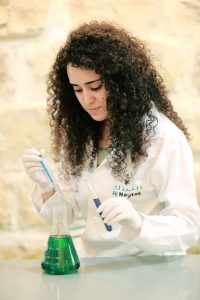
We need to tell our youth what they must not do, but other than that we must let them follow their desires and develop their talents. We should not claim that they possess what they do not have and must teach them not to exaggerate what they have or can do themselves − just because someone happened to celebrate them on stage and give them a prize even though their performance was only satisfactory. They must continue to learn and recognize that science is not always stable and that there are no static facts. Suspicion is the master of certainty. We should not accept that our youth become cheap laborers, inspecting the products of others who are creative producers; we should not encourage them to work for technology companies that are facades for unknown companies that take advantage of our people’s expertise while underpaying them. Our children should know that they do not know everything, but they must learn to recognize from the start what is silly.
The opportunity for us, as Palestinians, is great. Not only because almost three-quarters of the Palestinian population are of an age at which they can learn and engage in future business opportunities, but because even though our state is small and our number is comparatively small, the mental potential of our youth is overwhelming. Our children must turn the present and future into a global success story, and we must advocate for science, knowledge, technology, and production. Ahmad, Mona, and Ibrahim should be considered models to be followed.

